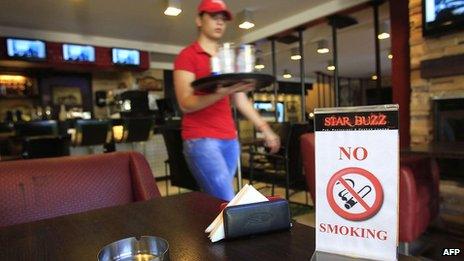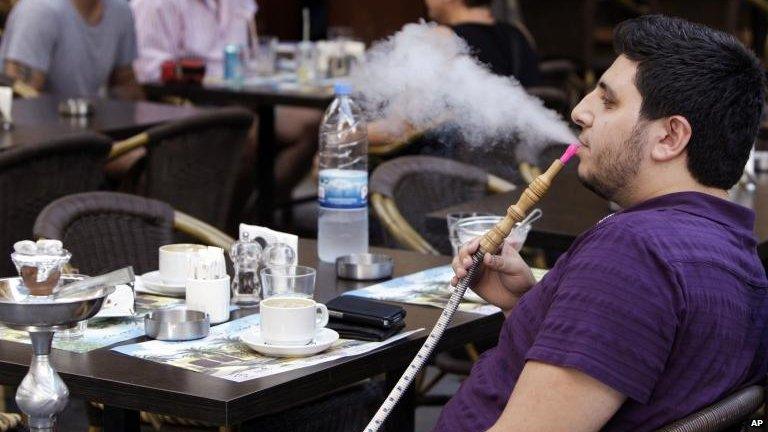Lebanon smoking ban draws dismay and delight
- Published

Smoking inside restaurants, cafes, pubs and clubs is now banned in Lebanon
Lebanon, many argue, has bigger fish to fry.
So far this summer, the country has dealt with gunbattles in Beirut, warring Sunni and Alawite neighbourhoods in Tripoli, waves of kidnappings, an increase in bank robberies, untold numbers of tyres burned by angry residents blocking roads, and up to 12-hour rolling blackouts linked to an employee strike at the state-owned electricity company.
Yet on Monday, the authorities turned their attention to banning smoking inside restaurants, cafes, pubs and nightclubs.
Sitting outside the Rabbit Hole pub in Beirut's Hamra neighbourhood, smoking a cigarette, 25-year-old Pauline Ohanian says she supports the ban.
"I'm happy Lebanon's doing something beautiful. It's good."
She too, however, was quick to note the state has more pressing matters to address - an argument commonly made by the law's critics.
"It's stupid in this country," said Ryan Rajeh, who was puffing away outside of Dany's pub in Hamra. "They should care about other things than smoking."
Like many countries in the Middle East, Lebanon has a reputation as being very smoker-friendly. A 2009 survey of Lebanese between the ages of 25 and 64 by the World Health Organization, external found 47% of men smoke as do 32% of women. Packs of cigarettes cost $1.60 or less, depending on the brand, with the cheapest available for only 50c.
Peter Rassie, 18, is particularly put off by the ubiquity of cigarettes and hopes the ban will change that.
"I went to travel, and in the airport, there was a cop with his hand in front of the no-smoking sign, smoking a cigarette," he said. Mr Rassie and two friends were walking around Beirut on Monday night to explain the law to people and monitor any violations.
Previous ban
The trio are members of Beirut's Rotoract Club and were working with a group of volunteers known as the Tobacco Control Citizen Watch - which was formed in June to be an extra pairs of eyes helping the authorities enforce the ban.
In fact, while cigars, cigarettes and the water pipe Lebanese call arguileh were outlawed in the hospitality sector this year, smoking has been banned in all other public indoor places since September 2011.
Enforcement has been patchy, and there are no official statistics on how many fines, which range from $90 to as much as $2,700, have been handed out in the past year.
Mr Rassie and his friends said they saw no-one breaking the law on Monday night, and patrons of Demo, a pub in the Gemmazye district, were dutifully stepping outside to light up.
Zakaria Mallak, a 23-year-old smoker who works behind the bar, said the ban is "definitely good".
"I'll finally get my sense of smell back," he joked with a customer.
"I feel like when there's 10 ashtrays on the bar, I'm smoking half of each cigarette," he said. "And everyone blows their smoke on me."
In the days leading up to the ban, many scoffed at the state's ability to implement the legislation in the hospitality sector. However, "no smoking" signs were posted on the fronts of restaurants, cafes and pubs across the city.
Protest
A few kilometres north of the capital, owners of cafes that serve arguileh held a two-hour sit-in in the town square of Antilias to protest against the ban.
Along with the Syndicate of Owners of Restaurants, Cafes, Nightclubs and Pastries, they were demanding amendments to the law to allow smoking in some establishments.
MPs have yet to publicly signal a willingness to oblige.
The syndicate argues the enforcement of the ban in the hospitality sector could be unevenly applied, giving unfair advantage to any place that is allowed to flout the law.
A survey of its members Ernst & Young conducted for the group before the ban found 71% think the authorities cannot enforce the law.
Many cynics also note that seatbelt and speeding laws are occasionally enforced stringently for a week or two before police seemingly forget they exist. When asked if she thinks the law will stick, Ms Ohanian was optimistic.
"I'm sitting outside," she said before beginning to gripe.
"Sure, people are passing by, the valet guys are looking at me, I'm listening to this drunk guy," she complained about an old, dishevelled man with a long beard and wild hair, sitting on a curb mumbling. "But it's cool, you know."
- Published3 September 2012

- Published15 August 2012

- Published3 February 2011
- Published10 January
